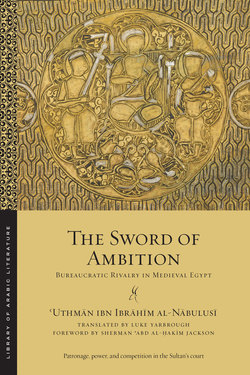Читать книгу The Sword of Ambition - 'Uthman ibn Ibrahim al-Nabulusi - Страница 11
На сайте Литреса книга снята с продажи.
ОглавлениеFOREWORD
SHERMAN ʿABD AL-ḤAKĪM JACKSON
A prominent scholar of Islamic history once wrote, “Ulamalogy is a noble science—at least we have to think so, because it is almost all the Islamic social history we will ever have.” This sentiment about ulama—religious scholars and jurists—underscores a perduring tension in the study of premodern Islam, between the ideal theories and prescriptions laid down by those writers on the one hand and quotidian reality on the other. Even the descriptive efforts of premodern Muslim historians afford scant insight into social trends, attitudes, actors, or movements. And it is in this context that the value of the present work is thrown into bold relief.
The Sword of Ambition (Tajrīd sayf al-himmah li-stikhrāj mā fī dhimmat al-dhimmah) might be described as a social polemic packaged in the language of Islamic law. Its author, ʿUthmān ibn Ibrāhīm al-Nābulusī (d. 660/1262), a noted official in the Ayyubid state, sets out to undermine the legitimacy of non-Muslims serving in positions of political authority. Not only are non-Muslims untrustworthy in Ibn al-Nābulusī’s view, for him the very fact of their functioning in any official capacity in a Muslim state violates the ideal Islamic social order, which, he intimates, is supposed to reflect the absolute supremacy of Islam and the subordination of all other religions. Thus, Ibn al-Nābulusī is relentless in adducing Qurʾanic verses, Prophetic hadiths, statements and actions of the prophet Muhammad’s Companions, the early caliphs, governors, scholars, and even poets, to substantiate both the impermissibility and the impropriety of non-Muslims serving in Muslim government.
We must be careful, however, as we negotiate the ferocity of Ibn al-Nābulusī’s invective, not to be seduced into overestimating or underestimating its value or meaning. Ibn al-Nābulusī clearly casts his arguments in explicitly legal terms, as he wants to convey the sense that he is motivated not by personal bias but by piety and an assiduous commitment to the ideals and interests of Islam. Yet, by de-contextualizing scripture, conflating its general descriptions with specific identities, by suppressing countervailing texts and historical examples, and by imputing to early generations the authority to hand down permanently binding findings of fact, Ibn al-Nābulusī ultimately tips his hand. To take just a couple of examples, he completely suppresses Qurʾanic statements that speak to the trustworthiness of Jews and Christians, for example: «And among the People of the Book are those whom if you entrust them with an entire treasure, they will promptly return it to you….» (Q Āl ʿImrān 3:75). Meanwhile, he leaves us to assume that a Jew’s or a Christian’s commission of this or that indiscretion as a matter of fact translates into a permanent, inextricably inherent character trait of all Jews and Christians.
But rather than dismiss Ibn al-Nābulusī’s campaign as a simple expression of prejudice, we must remain open to the possible degree of factual veracity it contains and to what his manner of proceeding tells us about the broader sociopolitical reality and perceptions prevailing at the time. The fact, in other words, that Ibn al-Nābulusī loathes the idea of non-Muslims serving in government should not be taken as proof that all of the infelicities, ruses or moral failings he attributes to individual Jews and Christians are necessarily factually false. Indeed, to dismiss him in this manner would be to forfeit the value of The Sword of Ambition as a source for social history. For Ibn al-Nābulusī’s attitudes, the facts and non-facts he tells about Jews and Christians, why he recounts these, the perceived need to write such a tract, why and how he couches his arguments in explicitly legal language, why his recriminations seem to be directed almost solely at non-Muslims and not at the rulers or high officials who appoint them, and how the contents of this work compare with what the historical record tells us about the actual reality of Jews and Christians serving in Muslim government—all of this provides invaluable insight into the sociopolitical and, indeed, sociopsychological realities of the time.
Of course, beyond social history per se (or perhaps we should say in addition to social history) this tract provides valuable insight also into how extralegal, pre-rational mindsets and experiences inform the deployment of legal sources and arguments, and thus influence the substance and contours of the law. In the modern West, movements such as legal realism and critical legal studies have tracked this relationship between interpretive presuppositions and the conclusions claimed to be grounded solely in the sources to very useful ends in their analyses of Western law. Ibn al-Nābulusī’s text both underscores the potential value of applying such approaches to Islamic legal history and provides a useful specimen on the basis of which to proceed in this regard.
We are all in debt to the translator for providing us with such an informed rendering of Tajrīd sayf al-himmah li-stikhrāj mā fī dhimmat al-dhimmah. We must hope that the interpretive strategies that we as readers employ in studying this text are sophisticated and imaginative enough to recognize its full value, enabling us to derive from it the fullest benefit and most meaningful insights.
Sherman ʿAbd al-Ḥakīm Jackson
University of Southern California
